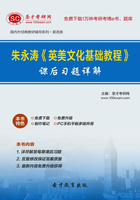
第3章 哪一个英语
I. Explain each of the following in English
1. Old English
Key: (1) Also called Anglo-Saxon, it is the first period of the English language from the time of the Anglo-Saxon invasion of Britain in AD 450 to the Norman Conquest in 1066.
(2) Old English used both Latin and Germanic scripts.
(3) Old English is the ancestor of Modern English. It is quite different from today's English.
2. Middle English
Key: (1)Middle English is the name given to the English language in use from the Norman Conquest of 1066 to the introduction of the printing press in England in 1476.
(2)Middle English is the blend of Anglo-Saxon, Latin and French.
(3)The difference between Old English and Middle English lies mainly in the abandonment of the system of grammatical inflexions.
3. Geoffrey Chaucer
Key: (1)Geoffrey Chaucer (1345—1400) was the most important Middle English poet.
(2)His masterpiece was The Canterbury Tales.
4. Nation Shall Speak Peace Unto Nation
Key: It is the motto of BBC which was established in 1927, the meaning of the motto is: Our corporation shall use a language that everybody is familiar with to spread peaceful voices to all the Nations of the World.
5. Modern English
Key: (1)Modern English is the English language since 1476.
(2)With the introduction of the printing press in 1476, spellings and written forms of the English language began to become standardized.
(3)The changes from Middle English to Modern English involve mainly pronunciation, vocabulary and spelling.
6. Standard English
Key: (1)The form of English written and spoken by educated speakers of the language.
(2)The style of speech of BBC announcers is usually recognized as Standard English.
(3)Standard English is also the most appropriate variety of English for a foreigner leaning English to copy.
II. Fill in the blanks
1. The Old English period lasted from _____ to _____.
Key: AD 587; AD 1066.
2. Old English used both _____ and _____ scripts.
Key: Latin, Germanic.
3. The official language of England after 1066 was _____.
Key: Norman French
4. The combination of the three languages, and _____, is known as Middle English.
Key: French
5. Geoffrey Chaucer used _____ English while William Shakespeare used _____ English.
Key: middle; modern
6. Modern English started from about _____.
Key: AD 1500
7. Standard English is based on the speech patterns of _____.
Key: BBC
III. Tick the correct answer in each of the following
1. Which of the following is not true? 1066 was important in English history because_____.
A. England was conquered in the Norman invasion
B. The Norman French became the official language of England
C. This was the beginning of Middle English
D. Anglo-Saxon language was beginning to die
【答案】D
2. The 1960s was characterized by three of the following except _____.
A. the fashion of speaking Americanisms
B. the Permissive Society
C. the Beatles
D. swinging London
【答案】D
3. The greatest single influence of the shaping of the English language in modern times is _____.
A. the ‘pop' revolution in the 1960s
B. the enormous increase in travel
C. American English
D. the French language
【答案】D
4. In what period of English did John Milton write?
A. Old English.
B. Middle English.
C. Modern English.
D. BBC English.
【答案】C
IV. Answer the questions.
1. Why has the English language changed so fast in this century?
Key: Because successive governments encouraged the idea of a more just and equal society, hallmarks of class distinction such as styles of speech and dress have been gradually discarded, especially by the younger generation.
2. Why did Anglo-Saxon become a language of low social status after 1066?
Key: After William's victory, most important positions, including high offices in the Church, were given to Normans who organized government and public affairs. As a result, many words connected with administration come from Norman French: words like realm, sovereign, tax, homage and assembly as well as the names of office holders such as chancellor, chamberlain, treasurer, marshall, governor, constable and warden. Many titles of nobility like baron, duke, count and marquis, derive from the French of this period; so do the words court and courtier and titles of respect such as sir and madam.
3. What are the basic differences between Old English and Middle English, and between Middle English and Modern English?
Key: The difference between Old English and Middle English lies mainly in the abandonment of the system of grammatical inflexions.
The difference between Middle English and Modern English lies mainly in pronunciation, vocabulary and spelling.
4. Why has the English language had a very strong association with class and social status? What difference have modern ideas of social equality made to language in Britain?
Key: This began from the Norman times when the upper classes spoke a completely different language from the common people.
With the ideas of social equality, hallmarks of class distinction such as styles of speech have been gradually discarded, especially by the younger generation.
5. What would you do if you wish to become proficient in English?
Key: I will listen to BBC.